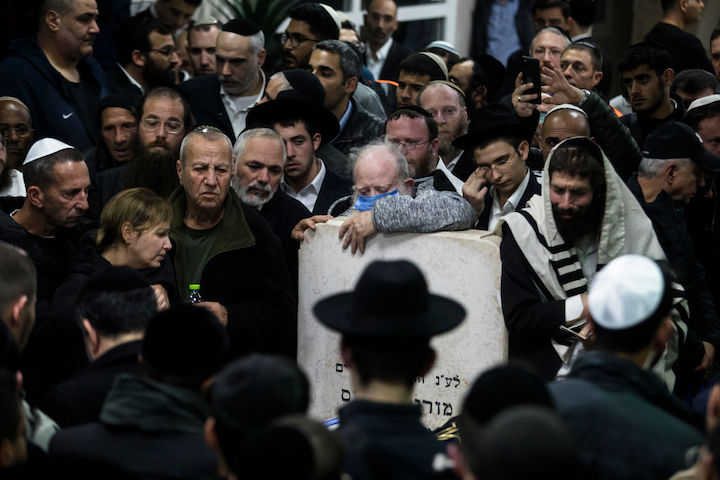Husam Zomlot is head of the Palestinian mission to London and an adviser to the country’s president Mahmoud Abbas, currently in the 18th year of his four-year term. Zomlot was interviewed by Sky News’s Kay Burley this week in response to Burley’s interview with Tzipi Hotovely, Israel’s ambassador to Britain. Both interviewees were asked about the synagogue murders in Jerusalem last Friday, in which seven Israelis were killed. They were also asked about a prior Israeli raid on an Islamic Jihad terrorist cell in Jenin, which killed ten Palestinians, including a civilian woman.
At the outset of the interview, Zomlot complained about Hotovely’s characterisation of the synagogue murders. He accused his counterpart of having ‘failed to mention that the incident in Jerusalem happened in an illegal settlement and that it is squarely the responsibility of the Israeli government to send their citizens to practise illegality’.
Just as she had confronted Hotovely on the Jenin operation, Burley asked Zomlot if he condemned the synagogue murders. Since he has claimed ‘misrepresentation’, I quote this part of the interview in full. For the sake of accuracy, Burley misstates the age of the perpetrator as 15. He was 21.
Kay Burley: Fifteen-year-old boy kills seven Israelis, including a newly-married couple helping the injured, shot outside a synagogue on Holocaust Memorial Day. Do you condemn that?
Husam Zomlot: Every life lost is absolutely a tragedy, and no one works for a non-violent solution to this more than us.
KB: Do you condemn it?
HZ: No… I condemn the origin of all this. That’s what needs to be condemned.
KB: So you don’t condemn that action?
HZ: (stutters) We can sit here until the morning to talk about condemnation. We must stop the cycle of violence. That’s what we need to do. And we must visit the root cause of this violence. For many, many years we have been…and media is guilty of that, is trying to draw some parallels, is…is…failing to focus on the actual cause of all this. And then we start to trying to just… like yesterday, you asked her is violence on both sides. What both sides? What are the both sides?
KB: I’ve just given you an illustration.
HZ: Where are, Kay, the both sides?
KB: I’ve just given you an illustration.
HZ: You know, when you go and kill all these people—
KB: If you won’t condemn it, will you at least send condolences to the families of those that died?
HZ: We have been…the Palestinian people and leadership have been doing that all along and have been expected… expected…not only to do that but to provide protection to our own jailers, our own occupiers, colonisers, besiegers, and we have been doing that all along.
Zomlot is a seasoned diplomat and therefore skilled in the precise and deliberately imprecise use of language. His refusal to condemn the murders was no mistake. The pivot to familiar-sounding cliches about ‘the cycle of violence’, something I objected to in my Coffee House piece earlier this week, reflects the Palestinian Authority’s strategy of speaking the language of incitement at home while its diplomats, such as Zomlot, speak the language of peace and human rights abroad. The dichotomy is underscored by Zomlot’s claims of providing ‘protection to our own jailers’.
What the Palestinian Authority actually does is send money to the families of terrorists who murder Israelis. Known as the Martyr’s Fund, this annual fixture of Ramallah’s budget saw £139 million in 2020 alone handed to the relatives of Palestinians captured or killed in terrorist attacks on Israelis.
There was an event in Israel this morning that could be thought of as a coda to Zomlot’s comments. In Ramat Gan, near Tel Aviv, Mahamat Déby, president of the Republic of Chad, opened his country’s new embassy to Israel. Chad is the latest Muslim-majority country to form or strengthen relations with the Jewish state, which in Chad’s case resumed in 2019 after being terminated in 1972. It’s perfectly possible to have relations with Israel while championing the rights and self-determination of the Palestinians. Pretty much all countries that have relations with Israel do so.
But Ramallah should see this trend as ominous, because it is. As I observed in 2020, when the United Arab Emirates reached its normalisation agreement with Israel, ‘the Palestinian cause is being shunted to make way for a new Middle East, in which Israel is one of the main power brokers and looked to by its Arab and Muslim allies for protection and prosperity’. Chad is the latest country in the MENA (Middle East and North Africa) region to decide that relations with Israel are necessary, whatever sympathies it feels for the Palestinians. It will not be the last.
The Palestinian Authority continues to choose rejectionism, incitement and extremism. We saw the consequences of that choice in the deaths of seven Jews on Friday evening. We see them elsewhere, too: in the slow death of pan-Arab and pan-Muslim solidarity with the Palestinian cause.







Comments